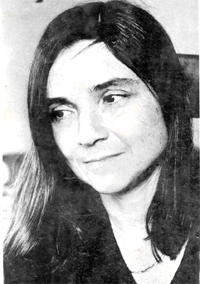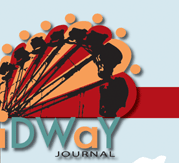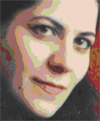
Adrienne Rich in her thirties
Introduction:
In my country the most famous American poet after Walt Whitman and Emily Dickinson is regrettably Sylvia Plath. I say regrettably because her fame is not because of her poetry. Her tragic life and death makes people eager to buy her poems in Farsi or to see the movie about her marriage and suicide. Last year one of our women theater directors brought her life on the stage under this title:
“One more night stay alive Sylvia!”
I personally knew nothing about Adrienne Rich until reading Anne Stevenson’s biography of Plath, Bitter Fame. I found there for the first time Adrienne Rich's name as one of Plath’s most important rivals. In a letter to her mother, Plath writes:
Arrogant, I think I have written lines which qualify me to be the poetess of America.. Who rivals? Well, in history Sappho, Elizabeth Barrett Browning, Christina Rossetti, Amy Lowell, Emily Dickinson, Edna St. Vincent Millay—all dead. Now: Edith Sitwell and Marianne Moore, the aging giantesses, and poetic grandmother Phyllis McGinley is out—light verse: she's sold herself. Rather: May Swenson, Isabella Gardner, and the most close, Adrienne Cecile Rich—who will soon be eclipsed by these eight poems.
These few lines aroused my curiosity about Rich's poetry and I fell in love with her very poetry at first glance. Reading Rich I felt again the earth beneath my feet after so many years, while reading Plath I always feel that I am sinking and I can never go forward. Reading Rich I could believe in life, love and peace in spite of death, disloyalty and never ending wars. I learned from Rich to resist in my poetry and in my life.
Time, which is the best judge, proved that contrary to what Plath expected, Rich not only eclipsed Plath but turned into one of the most powerful voices in the history of American poetry, and not because of her private stories but only because of her fine and strong poems.
I love her pride and purity as a poet, rejecting the most important awards granted by owners of violence and wealth. I introduced her poems to Iranian readers, first in my anthology of women poets and then in my anthology of American contemporary poets. Let me tell you that Rich's poetry in translation loses everything but poetry itself, simply because it is the language of spirit, not only the language of heart or head. And the language of spirit is common between trees, rivers, and the essence of poetry.
This interview was arranged in the first period of G.W. Bush's presidency and I waited until to this day to see the changes. People in the United States elected Obama with hope for real changes in foreign policy. I now find Rich's answers to my political questions are more meaningful than in the original context of the interview.
One last point: The most beautiful thing in this interview in my opinion is Rich's modesty. She knows the art of not being arrogant as a very famous poet. I kiss her beautiful soul from the far and I share her honest responses with international readers of this e-magazine.
***********
Editor’s note: This interview is adapted from Hassanzadeh-Mostafavi’s collection
Eternal Voices: Interviews with Poets East and West, forthcoming from Negah Publications in Iran. Her anthology of American
contemporary poetry appeared last year from the same publisher.
*********************
F.H.M: Isadora Duncan Writes: "I wonder if a woman can really be an artist, since art is a hard taskmaster who demands everything, whereas a woman who loves, gives up everything of life ....."
May I ask if in your life "the imperious call of art" has ever put "a tragic end to love "?
A.R.: Isadora Duncan has never been one of my heroines! Her words ring rather hysterical to me. I assume she is alluding to a certain kind of passion-love (or obsession) which could leave a woman or for that matter, a man, temporarily unable to focus on anything else. Women, it's true, have been required to sacrifice creative work for love or domesticity, in many traditions--sometimes by force. And women artists have been ignored or dismissed by male critics and scholars. Let's hope that the world-wide feminist movements succeed in unsettling that along with many other traditionalist opinions about gender. There are many kinds of love.
I do not believe we, as human beings, should be forced to choose between love and work. Both are necessary components of a fully lived life. Art is a demanding discipline, but the greatest art thrives on relationship—not self-sacrifice but the intensely felt connection with other human beings.
F.H.M: All over the world, there is a gap between artists and politicians. They are vastly different in their ideals. It seems in your country this gap is widening. How do you feel about America’s big-stick policy toward third-world countries?
A.R.: I am utterly against imperialism, unilateralism, colonialism of all kinds. I have opposed my government's past and present adventures in this regard for much of my life, and am deeply disturbed by the (possibly contaminated) re-election of the extremist, law-defying Bush-Cheney administration. At present, an ominous note is being struck regarding Iran, as "the next Iraq." This is part of a policy of "perpetual war" and world-domination which I and thousands of other Americans find intolerable and have demonstrated, written, and voted against. That we have not been listened to by the current regime does not mean we will cease in our efforts as citizens of this country to register opposition.
F.H.M.: What do you know about Iranian literature?
Rich: What I know of Iranian literature has necessarily depended on available translations, some better than others of course. I've depended on various anthologies of Arabic poetry in English, including Salma Jayyusi's Modern Arab Poetry and Nathalie Handal's The Poetry of Arab Women. The two poets I am most acquainted with are Forough Farrozhad and Shamlu.
F.H.M.: It seems you are the only poet in the U.S.A. who knows something about
Iranian contemporary literature. Believe me. I've arranged interviews with more than 20 American poets and except Karen Swenson who traveled to Iran before the Islamic revolution, no one knows Iranian contemporary poets. Some of them have seen Iranian movies, of course. And you, my dear, I am really surprised that you've read Iranian poems in Modern Arab Poetry. We are not Arab. We are Muslim but we are not Arab. We speak Farsi.
A.R.: I first want to apologize for my apparent thick headedness in suggesting that Iranian is Arabic or that Iran is an Arab nation. I knew better but was trying to recall the anthologies in which I have read poetry of the Middle East. You must have thought, "typical American ignorance or indifference." Shamlu's poetry I have read on the web, sent to me by an Iranian woman living here for many years. I found it extremely moving.
F.H.M.: Unlike many contemporary poets who never listen to anything but the loneliness of their heart, you involve yourself in the disasters of the modern world and sympathize with victims of war and of Imperialism. Has this moved you away from poetry as a form of art or has it taken you closer to the true essence of poetry?
A.R.: I believe that for poets all over the world the human condition, not simply their own private grieves, has been a profound source of poetry. I think of Neruda, Roque Dalton, Nazim Hikmet, Mahmoud Darwish, Bertolt Brecht, Paul Celan, Kamau Brathwaite, Aimé Césaire, our Walt Whitman, Muriel Rukeyser, Gwendolyn Brooks, Robert Hayden, Thomas McGrath, June Jordan--to name some whose work I turn to over and over.
For me, the question is, Why should poetry NOT engage with the largest possible range of materials, and how can we live in a world such as this and draw a circle around our concerns?
F.H.M.: In 1949, Muriel Rukeyser wrote: "Poetry is foreign to us ,we don't let it enter our daily "lives." Does poetry have acknowledged place in American life today?
A.R.: Your question is a little difficult to answer because we have so over-commercialized and materialistic a mainstream culture, and it is getting worse: poetry is "marketed" once a year in April, "National Poetry Month," but neglected by that commercial culture otherwise. However, poetry has, I believe, a life of its own: in the Soviet Union under Stalin there were "samizdats," poems passed secretly around and memorized; here, there are many pockets and communities where poetry is written and read; we still have small presses and magazines publishing non-commercial poetry. I would say there is, since Bush's first term, an ever-growing gap between the official culture and media and the cultures of art and resistance. I have written extensively about this in my prose book, What is Found There: Notebooks on Poetry and Politics.
F.H.M.: In which role do you feel yourself truer and more influential—as a poet or as a wife and mother of three children?
A.R.: I was married for seventeen years. My three sons are now 45, 47 and 49. (The photo on the cover of your anthology shows me in my thirties—I am now 75). For the past twenty-nine years I have lived with a woman, who is also a writer. We are both close to my sons, and my two grandchildren. I have also been a teacher. So my life is a bit more complicated than your question suggests. I have tried to live as truly as possible in whatever aspects of my life. As to influence, there are direct (visible) and indirect kinds, and we can't really know how our lives and words will resonate; I think we have to strive for integrity and honesty, as parents, lovers, friends, artists.
F.H.M.: -How do you interpret the September 11th tragedy? What do you think about a classification of American literature before and after the tragedy? Here is Sam Hamill's answer to this question: "If this man (Bush) is re-elected, we may divide American literature at THAT point: Before and after the fall of American democracy."
A.R.: I have a great deal of admiration for Sam Hamill, but I find this statement extreme and over-simplifying. American democracy has been imperfect from the beginning, and has been increasingly endangered for several decades. I am a Marxist and a socialist (without a party!) and believe that democracy means more than elections; it requires social and economic justice and truly equal access to resources, including education and media.
As to September 11, 2001, I think it is much too soon to classify American literature before and after. Literature evolves more slowly if it is more than a shallow response. And a lot of work is being produced that we don't know about yet.







 Farideh Hassanzadeh -Mostafavi- is an Iranian poet, translator and freelance journalist. Her first book of poetry was published when she was twenty-two. Her poems appear in the anthologies Contemporary Women Poets of Iran and Anthology of Best Women Poets. Her English translations appear in Kritya, Jehat, Interpoetry, Foreign Policy in Focus, nearthfamilyalpha and Thanalonline .
Farideh Hassanzadeh -Mostafavi- is an Iranian poet, translator and freelance journalist. Her first book of poetry was published when she was twenty-two. Her poems appear in the anthologies Contemporary Women Poets of Iran and Anthology of Best Women Poets. Her English translations appear in Kritya, Jehat, Interpoetry, Foreign Policy in Focus, nearthfamilyalpha and Thanalonline .